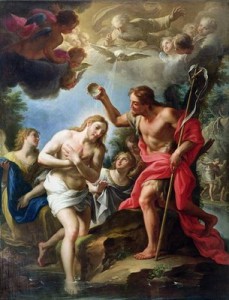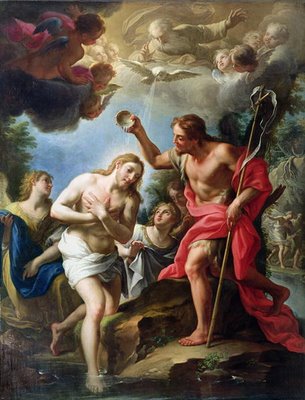
Central idea: The Baptism of the Lord is an epiphany of the heart of the Blessed Trinity. Doctrine: The saving love of the Blessed Trinity. Practical application: Humble lives of prayer.
To view Lectionary 21, click here.
Central idea: The Baptism of the Lord is an epiphany of the heart of the Blessed Trinity
Reading 1 Is 42:1-4, 6-7
Thus says the LORD:
Here is my servant whom I uphold,
my chosen one with whom I am pleased,
upon whom I have put my spirit;
he shall bring forth justice to the nations,
not crying out, not shouting,
not making his voice heard in the street.
a bruised reed he shall not break,
and a smoldering wick he shall not quench,
until he establishes justice on the earth;
the coastlands will wait for his teaching.I, the LORD, have called you for the victory of justice,
I have grasped you by the hand;
I formed you, and set you
as a covenant of the people,
a light for the nations,
to open the eyes of the blind,
to bring out prisoners from confinement,
and from the dungeon, those who live in darkness.
- Isaiah foresees the Messiah, chosen by God, endowed with God’s spirit, formed by God.
- This chosen servant’s work is not just for Israel: it is universal, for the nations, for the earth.
- He will be the covenant between God and humanity.
- His work is justice: to put men in a right relationship with God and one another.
- His work will not be accomplished by might or violence.
- He will liberate man.
Responsorial Psalm Ps 104:1b-2, 3-4, 24-25, 27-28, 29-30
R. O bless the Lord, my soul
O LORD, my God, you are great indeed!
you are clothed with majesty and glory,
robed in light as with a cloak.
You have spread out the heavens like a tent-cloth;You have constructed your palace upon the waters.
You make the clouds your chariot;
you travel on the wings of the wind.
You make the winds your messengers,
and flaming fire your ministers.How manifold are your works, O LORD!
In wisdom you have wrought them all—
the earth is full of your creatures;
the sea also, great and wide,
in which are schools without number
of living things both small and great.They look to you to give them food in due time.
When you give it to them, they gather it;
when you open your hand, they are filled with good things.If you take away their breath, they perish and return to the dust.
When you send forth your spirit, they are created,
and you renew the face of the earth.
- God is the mighty creator and sustainer of all creation.
- Whether looked at from the more primitive, prescientific point of view of direct observation of the heavens and the earth or from the most modern scientific perspective, the universe is awesome in its age, in the complexity and interactivity of non-living and living beings, and in the power and dynamism in all things.
- Thus, how great, powerful, and wise God must be who calls everything that exists in creation out of nothing and who sustains it in being at every moment.
- This psalm also hints at the Holy Spirit when it speaks of the light, wind, fire, breath, and spirit.
Reading 2 Ti 2:11-14; 3:4-7
Beloved:
The grace of God has appeared, saving all
and training us to reject godless ways and worldly desires
and to live temperately, justly, and devoutly in this age,
as we await the blessed hope,
the appearance of the glory of our great God
and savior Jesus Christ,
who gave himself for us to deliver us from all lawlessness
and to cleanse for himself a people as his own,
eager to do what is good.When the kindness and generous love
of God our savior appeared,
not because of any righteous deeds we had done
but because of his mercy,
He saved us through the bath of rebirth
and renewal by the Holy Spirit,
whom he richly poured out on us
through Jesus Christ our savior,
so that we might be justified by his grace
and become heirs in hope of eternal life.
- The Messiah foreseen by Isaiah is Jesus Christ “our great God and savior.”
- Isaiah foresaw Christ’s work as universal. St. Paul reminds Titus that “the grace of God has appeared, saving all.”
- As Isaiah foresaw, Christ’s work is justice: to put men in a right relationship with God and one another. He does this by delivering us from our sins, cleansing us of them, and training us to live rightly.
- As Isaiah foresaw, Christ’s work is not accomplished by might or violence. Rather, in his mercy, he gives us grace through Baptism: “The bath of rebirth and renewal by the Holy Spirit.”
- As Isaiah foresaw, Christ liberates man: his grace and training will cleanse us and help us become “eager to do what is good” and “heirs in hope of eternal life.”
Gospel Lk 3:15-16, 21-22
The people were filled with expectation,
and all were asking in their hearts
whether John might be the Christ.
John answered them all, saying,
“I am baptizing you with water,
but one mightier than I is coming.
I am not worthy to loosen the thongs of his sandals.
He will baptize you with the Holy Spirit and fire.”After all the people had been baptized
and Jesus also had been baptized and was praying,
heaven was opened and the Holy Spirit descended upon him
in bodily form like a dove.
And a voice came from heaven,
“You are my beloved Son;
with you I am well pleased.”
- The Jews who came to John for his baptism in token of repentance from sin had an intense expectation that the Messiah was about to arrive. They wondered if he was John.
- The mightier one John pointed them to would have for them a baptism of the Holy Spirit and fire.
- Why did Jesus want to be baptized? Why did God the Father and God the Holy Spirit choose to reveal themselves here? The Homiletic Directory (HD) provides answers.
Doctrine: The saving love of the Blessed Trinity
- Last week we celebrated the Epiphany. The Church actually sees the Epiphany as three events that manifest the divine glory of Christ. They are the appearance of the magi at the time of Jesus’ birth, the Baptism of the Lord at the Jordan, and the sign Jesus worked at the wedding feast at Cana at the beginning of his public life (HD 131).
- The Baptism of the Lord is “an epiphany of the mystery of the Holy Trinity” (HD 131). God the Father reveals that Jesus is his beloved son and that he is well pleased with him. The Holy Spirit descends in the bodily form of a dove as confirmation.
- This “epiphany of the mystery of the Holy Trinity” is one of the ways that God has revealed that he is both one and triune.
- This epiphany also reveals something of God’s inner self. Why is the Father “well pleased” with the Son? Jesus did not need John’s baptism because he had nothing of which to repent. Rather, he wanted to stand in solidarity with us sinners. “[W]hat pleases the Father is precisely the Son’s willingness to stand in solidarity with sinners. In this way [Jesus] shows himself to be the Son of this Father, this Father ‘who so loved the world that he gave to it his only Son’ (Jn 3:16). In the same instant, the Spirit appears like a dove, descending upon the Son, functioning as a sort of accreditation or authorization of the whole unexpected scene.” (HD 133) So, in the heart of the Blessed Trinity is not wrath but tender mercy toward us sinners.
- Why did this manifestation occur here? “Jesus’ baptism by John was not his ultimate baptism but an acting out in symbolic fashion of what he would accomplish in the baptism of his final agony and death on the cross. For it is on the cross that Jesus shows himself, not merely in symbol but in very deed, in complete solidarity with sinners.” (HD 136) After Christ’s death, the centurion echoed God the Father’s declaration: “Truly this was the Son of God!” (Mt 27:54).
- In virtue of our baptism into the life, death, and resurrection of Christ, the words of the Father spoken at Jesus’ baptism also apply now to us. We have a new name: “‘Beloved! In whom I am well pleased.’ We hear this name as ours not because of any good deeds we have done but because Christ in his overflowing love willed to share his relationship to his Father with us.” (HD 137)
- We ought to always have an inner happiness because the Blessed Trinity holds us in loving approval.
Practical application: Humble lives of prayer
- Because of events like the Baptism of the Lord, it is possible for us to have constant lives of prayer. If we were not beloved by God, if God were not well-pleased with us, we would not be able to meditate, dialogue with God, or contemplate his presence. How could we stand constantly being in the presence of a person who basically hates us?
- But because we are beloved and approved, we can think about Him, talk to Him, and sit in silence before Him listening.
- Our prayer is not a proud self-congratulation due to being friends of God. Rather, we humbly consider that we can pray because “Christ in his overflowing love willed to share his relationship to his Father with us.”
Written as an aid for homilists and a resource for the faithful, this doctrinal homily outline (1) provides insights into the Lectionary readings, (2) explicates a doctrine of Catholic Faith or morals from them, and (3) shows specific ways lay persons can live these truths. (To read more about this approach, click here.)
This outline is written to be in accord with the Homiletic Directory issued by the Congregation for Divine Worship and the Discipline of the Sacraments (2014). (To read an excellent summary of the Homiletic Directory, click here.)

Leave a Reply